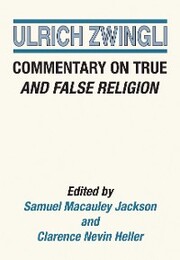Detailansicht
Commentary on True and False Religion
eBook - The Latin Works and Correspondence of Huldreich Zwingli
ISBN/EAN: 9781725235892
Umbreit-Nr.: 2292037
Sprache:
Englisch
Umfang: 424 S.
Format in cm:
Einband:
Keine Angabe
Erschienen am 18.06.2015
Auflage: 1/2015
E-Book
Format: PDF
DRM: Adobe DRM
- Zusatztext
- Next to Luther himself, Ulrich Zwingli (1484-1531) was probably the most important and certainly the most influential of the early Protestant reformers. His Commentary on True and False Religion, addressed to King Francis I of France and published by the printer Froschauer in Zurich in 1525, contrasted what Zwingli regarded as the true religion of the Protestants, grounded in Scripture, with the false religion of tradition and reason advocated by the opponents of the Reformation. In twenty-nine chapters Zwingli discussed all of the principal topics of Christian theology, from the meaning of the word "religion" itself to the role and place of images in Christian worship. All the disputed issues of the early Reformation--the doctrine of Church and ministry, baptism, penance, eucharist, the nature of civil authority--are explained lucidly and concisely. The Commentary makes clear not only the grounds for Zwingli's break with the medieval Catholic tradition in which he had been raised but also the nature of his disagreements with Erasmus, Luther, and the Swiss Anabaptists. The result is the most significant dogmatic work which Zwingli ever wrote and the most important systematic statement of Reformed theology before Calvin's Institutes.
- Kurztext
- Next to Luther himself, Ulrich Zwingli (1484-1531) was probably the most important and certainly the most influential of the early Protestant reformers. His Commentary on True and False Religion, addressed to King Francis I of France and published by the printer Froschauer in Zurich in 1525, contrasted what Zwingli regarded as the true religion of the Protestants, grounded in Scripture, with the false religion of tradition and reason advocated by the opponents of the Reformation. In twenty-nine chapters Zwingli discussed all of the principal topics of Christian theology, from the meaning of the word &quote;religion&quote; itself to the role and place of images in Christian worship. All the disputed issues of the early Reformation--the doctrine of Church and ministry, baptism, penance, eucharist, the nature of civil authority--are explained lucidly and concisely. The Commentary makes clear not only the grounds for Zwingli's break with the medieval Catholic tradition in which he had been raised but also the nature of his disagreements with Erasmus, Luther, and the Swiss Anabaptists. The result is the most significant dogmatic work which Zwingli ever wrote and the most important systematic statement of Reformed theology before Calvin's Institutes.
